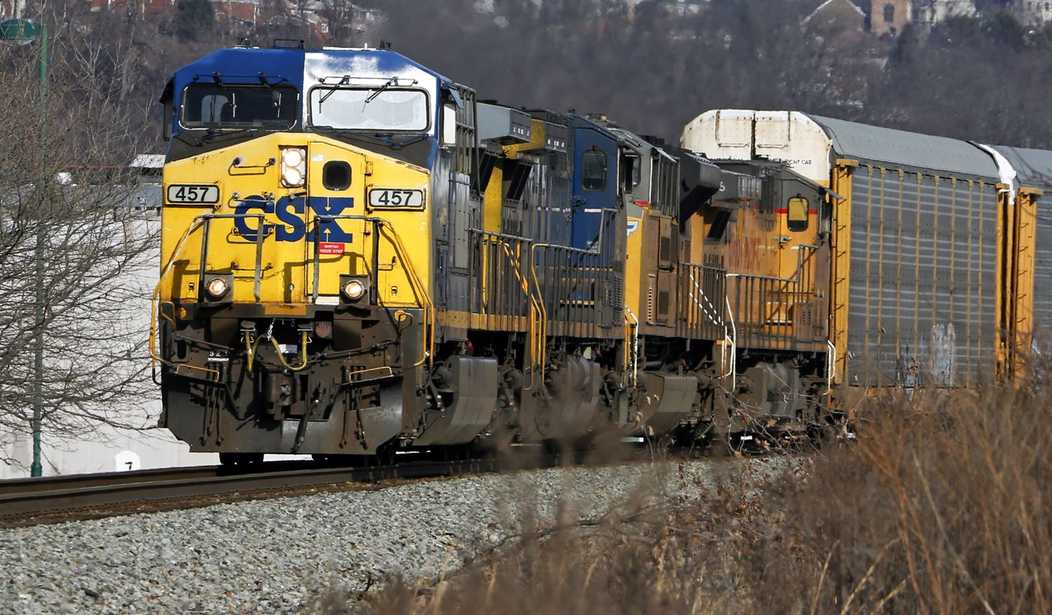Recently, two major railroad operators, CSX and Union Pacific, reported a significant drop in earnings, in part due to declining rail shipments. This was partially due to the impact of ongoing trade disputes. While we generally support a better trade relationship with China (hopefully with fewer tariffs and nontariff barriers), we need to see strong freight rail traffic if the economic expansion is going to roll on.
Legendary investor Warren Buffet once said that if he were stuck on a desert island and could only be given one number to know how the economy was doing, he would pick rail car traffic.
Our manufacturing, mining, merchandising and energy industries are dependent on freight rail and trucking. This is why we can't think of a worse time for Washington to be imposing new onerous regulations on the rail industry. One policy that could very negatively affect freight rail is the effort among some regulators inside the Trump administration and some in Congress to reregulate the rail industry during the time when it least needs additional red tape.
This is especially important because this is a president who prides himself on rolling back the regulatory surge under President Barack Obama. Remember: Two regulations repealed for every new rule passed.
We do not make a habit of praising Jimmy Carter on the economy, but signing the Staggers Rail Act into law was one of the most positive economic reforms of that era. The Committee to Unleash Prosperity co-founder Steve Forbes has referred to the deregulation of the railroads in the 1980s as an "economic miracle" we ought to learn from.
The Staggers Rail Act gave rail carriers greater flexibility to negotiate their own prices and contracts, and as a result, a recent study by the American Action Forum found that rail shipping costs in 2016 were "45 percent lower than in 1981, the first full year of operation under the partial deregulatory structure."
Recommended
Cliff Winston, an economic scholar at the liberal Brookings Institution, has found that rail deregulation both saved the industry from nationalization and led to big savings for the industry and consumers. He found:
"The evidence strongly indicates that rail deregulation accomplished its primary goal of putting the U.S. rail freight industry on a more secure financial footing. Surprisingly, deregulation has also turned out to be a great boon for shippers as rail carriers have passed on some of their cost savings to them in lower rates and significantly improved service times and reliability.
"I conclude that a fully deregulated environment, which would entail elimination of residual regulation by the Surface Transportation Board, will further benefit the industry."
Lower prices have translated into tens of billions of dollars of savings for consumers on the thousands of goods and products shipped by rail throughout the country on a daily basis.
Unfortunately, this successful regulatory restraint is now being put to the test as Donald Trump's own agencies flirt with new and highly unfair rules overseeing rail practices. The biggest threat the rail industry faces comes from a Surface Transportation Board proposal known as the "forced switching" rule. The forced switching rule would force rail operators to turn over their freight cars to competitors at potentially below-market prices.
This rule change is an assault on the rail companies' private property rights. Having them share their freight cars with competitors would be like requiring FedEx to deliver packages for UPS. This is also similar in some ways to the ill-designed net neutrality rules many in Congress are pushing.
This price control scheme would be similar in nature to net neutrality, wherein broadband carriers are prohibited from charging more money to companies that use the most of their bandwidth or "lanes." Why should someone be forced to carry another person's goods through their channels without receiving proper compensation?
If enacted, the forced switching rule would severely restrict rail carriers' freedom to negotiate their own contracts -- even though this freedom was what made the industry so successful in building its network and lowering costs for consumers in the first place. Any cost-savings in the short term would be offset by less capital investment in rail as these rules create literal "free riders."
To add insult to injury, some in Congress want to do the biddings of the unions and require mandatory crew sizes on rail cars. This would come at a time when increasing automation is reducing work crews for rail delivery and lowering transportation costs. Does anyone really believe that locking in a specific rail crew size today will be appropriate two, five or 10 years from now? Locking in a set number of workers on a rail line makes as much sense as locking in a set number of workers at a McDonald's restaurant.
We hope Trump's White House will intervene and stop these congressional and agency schemes to reregulate rail. Low freight costs make American exports more competitive in global markets, which keeps jobs in America and lifts economic growth. That was as true 40 years ago as it is today.
Stephen Moore is a senior fellow at the Heritage Foundation and an economic consultant with FreedomWorks. He is the co-author of "Trumponomics: Inside the America First Plan to Revive the American Economy." To find out more about Stephen Moore and read features by other Creators Syndicate writers and cartoonists, visit the Creators Syndicate webpage at www.creators.com.
























Join the conversation as a VIP Member